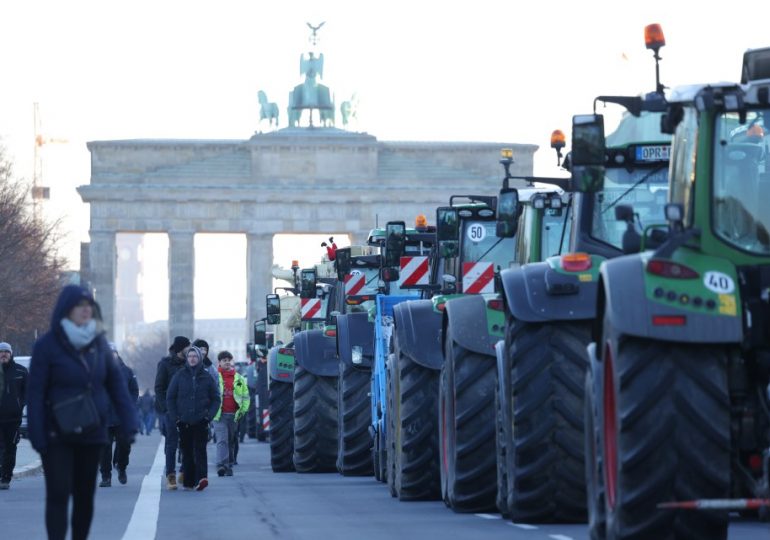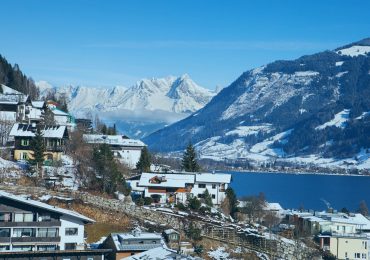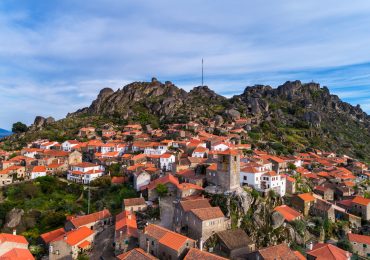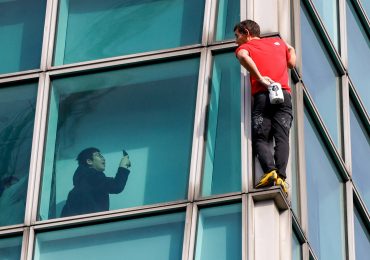LIGHTS flashing and horns blaring, 3,000 tractors trundled through Hanover in Germany bringing its streets to a gridlocked standstill.
Stepping down from his cab, arable farmer Axel Friehe told me his beleaguered nation’s economy is “breaking down”.
GettyTractors of protesting farmers line the streets in front of the Brandenburg Gate in Berlin[/caption]
EPAMajor German cities have been paralysed by demonstrating agricultural workers, truckers and small business people[/caption]
Louis WoodTurnip farmer Christoph Berndt said ‘The AfD use the demonstrations to draw attention to themselves’[/caption]
“We hope our protests are the start of something big,” he said of the tractor cavalcade being cheered by locals.
Farmer Friehe, 51, may soon have his wish.
Troubled Germany’s major cities have been paralysed by demonstrating agricultural workers, truckers and small business people.
Some 500 tractors gathered at Berlin’s landmark Brandenburg Gate and 5,000 paraded through Munich’s streets.
While French farmers have made protesting something of a national pastime — infamously torching a lorry full of British sheep in 1990 — their German counterparts are traditionally less militant.
Yet a heavy-handed bid by its government to slash a tax break on diesel used in agricultural machinery — worth around £2,500 a year to each farmer — has made zealots of German country folk.
I watched on Wednesday as locals in Hanover gave farmers hearty cheers and the thumbs up despite the traffic tailbacks in the north German city of 536,000 citizens.
For the tractor strike is a symptom of a wider malaise gripping Germany.
The country’s once booming export market made it the industrial powerhouse at the heart of Europe.
Yet since the pandemic its sluggish economy has grown by just 0.3 per cent — compared to 1.4 per cent in the UK — making it by far the worst performer in the G7 group of nations.
Stringent green initiatives, including the rolling out of heat pumps, have been unpopular with many.
‘Hungry, naked and sober’
And mass migration — last year Germany had more than 350,000 asylum applications — has become a major political flashpoint.
Its ruling coalition of the left-of- centre Social Democratic Party, the Greens and liberal Free Democrats have been trying to plug a near £15billion budget black hole.
Into this economic and social maelstrom has stepped the far-right Alternative for Deutschland, who critics say are “infiltrating” the farmers’ demonstrations.
A YouGov poll last Sunday showed almost one in four Germans — 24 per cent — backed the AfD.
Last week it was reported that high-ranking AfD officials were caught at a secret conference where a “masterplan” for the forced deportation of millions of migrants to Africa was discussed.
The meeting, at a luxury hotel last November, featured a talk by far-right Identitarian Movement activist Martin Sellner, who is permanently banned from the UK for extremism.
It was claimed that the “remigration” proposals discussed at the event, infiltrated by news network Collectiv, included deporting immigrants with German passports.
Those in attendance — reportedly alongside neo-Nazis — included Roland Hartwig, a personal aide to AfD leader Alice Weidel, and AfD MP Gerrit Huy.
The AfD denied it had a “secret plan” but added: “We need passport withdrawal for criminals and remigration!”
At last week’s Hanover protest, turnip farmer Christoph Berndt, 31, insisted: “The AfD use the demonstrations to draw attention to themselves.
“They say the farmers are on their side, which isn’t true.”
Driving nearly 40 miles on his green John Deere tractor to be at the good-natured demonstration, he added: “The politicians in Berlin make it more difficult for us to work and make money.
“So we go on to the street and try to animate people to understand us and what we do in the fields.”
German flags fluttered from tractor cabs with signs on their front loaders reading: “No food without us.”
Another read: “Without agriculture you’d be hungry, naked and sober.”
Air horns sounded in the sub-zero chill as farmers gathered outside Lower Saxony’s regional parliament building in Hanover.
@UNCOFILMLocals cheered the tractor cavalcade[/caption]
Expressing the fury felt by many, Volker Hahn, who helped to organise the demo, said: “The Government needs money and they will take it from the farmers. It’s a horrible situation.”
Volker, 55, who tends pigs, chickens and potatoes at his 600-acre farm, added: “We don’t welcome the support of AfD.
“They’re extreme.”
To add to the air of despondency felt by many, Hanover and other German cities have also been crippled by train driver strikes this week.
At the parliament building I met Sonja Markgraf, from the Rural People of Lower Saxony group, which also helped to organise the tractor protest.
She said: “The French people were always on the barricades but in Germany everyone felt comfortable.”
Now, she says, times have changed, with farmers seething at being asked to help plug the Government’s budget gap.
She added: “We are very happy that the protests are peaceful — but loud. The population stands behind us.”
Sonja, 53, says people from all backgrounds are facing unrealistic demands on environmental issues.
She added: “Heat pumps are a good example. It’s not wrong to do it, it’s the way they do it.
“It was too quick, wasn’t well explained and people are worried about the price.
“Reforms are necessary but you have to take the people with you.
“This feeling is in every part of the population, whether you’re poor, rich or middle-class. It’s not great for the general mood.”
She blames people’s fears over illegal immigration for AfD’s rise, saying: “Even three or four years ago it wasn’t an issue.
“Now the municipalities say they have no rooms, no flats or apartments so it’s more visible now.
“So the AfD tries to profit from it.”
Germany has long been renowned in British minds as a land of efficiency, where everything works.
It was praised for how it faced up to its Nazi past and built a vibrant, liberal democracy with a turbo-charged economy.
That booming post-war Germany was summed up in Audi’s 1980s advertising slogan “vorsprung durch technik”, meaning “progress through technology”.
Now its famed export trade of cars and machinery is in deep trouble.
German car makers produced almost 40 per cent fewer vehicles in 2022 than they did a decade previously.
Once reliant on Russian gas, Germany saw energy prices soar after Vladimir Putin’s 2022 Ukraine invasion.
And politicians have failed to tackle creaking infrastructure, a housing shortage and high-speed internet rollout.
Labelled the Sick Man of Europe — an historic term that was used to describe Britain in the 1970s — its economy is predicted to perform worse than Britain’s in the next decade.
Though expected to return to growth this year, Germany — the world’s third biggest economy — is forecast to be overtaken by Japan in 2026 and India in 2027.
At Hanover’s regional parliament building I met the AfD’s Frank Rinck, who denies his far-right party has “infiltrated” the farmers’ demos.
The MP and chairman of the Lower Saxony AfD said the group were “simply engaging with these demonstrations like any other political party”.
Frank, an agricultural contractor, says the Government’s subsidy cut will lead to a “further death” of the farming sector.
He added: “At some point our domestic agricultural sector will not be able to feed indigenous people.”
He said it was news to him that AfD politicians had attended a “remigration” conference, describing reports as “a storm in a teacup”.
He added: “In Germany things like this tend to come up when problems arise and people demonstrate.”
Watching the AfD’s rise warily are the centre-right Christian Democratic Union party, currently Germany’s leading party in opinion polls.
Its agriculture spokesman in Lower Saxony’s parliament, Dr Marco Mohrmann, ruled out working with the AfD in a coalition.
The dad of three told me: “A big part of the AfD is extreme right — and that’s not our way.”
While accepting Germany should take in asylum seekers and skilled migrants, he admitted Britain’s stuttering Rwanda policy may also be a way forward for his country.
Conservative-leaning Marco, 59, said: “I think the model the UK is doing with Rwanda is interesting.
“It’s a third-country solution where you can look at someone and decide if they can get asylum or not.
“A year ago we couldn’t discuss something like this but now we can, and we have to.”
German Chancellor Olaf Scholz has tried to contain farmers’ rage by phasing out the diesel tax break over time and scrapping plans to abolish tax exemption on agricultural vehicles.
Yet the scale of the protests — and their support across German society — suggests he has not done enough.
Yesterday 5,000 tractors and 10,000 protesters blockaded Berlin in a climax to a week of protest. Fresh talks with Government representatives are set.
Rural People of Lower Saxony’s Sonja Markgraf insisted: “If it’s not good for the farmers then we say, ‘We go on’.”
Germany’s Great Tractor Revolution may still only be in first gear.
Louis WoodVolker Hahn helped to organise the demonstration in Hanover[/caption]
GettyGerman Chancellor Olaf Scholz has tried to contain farmers’ rage by phasing out the diesel tax break over time and scrapping plans to abolish tax exemption on agricultural vehicles[/caption]
Louis WoodSonja Markgraf, from the Rural People of Lower Saxony group, also helped to organise the tractor protest[/caption]
Leave a comment








